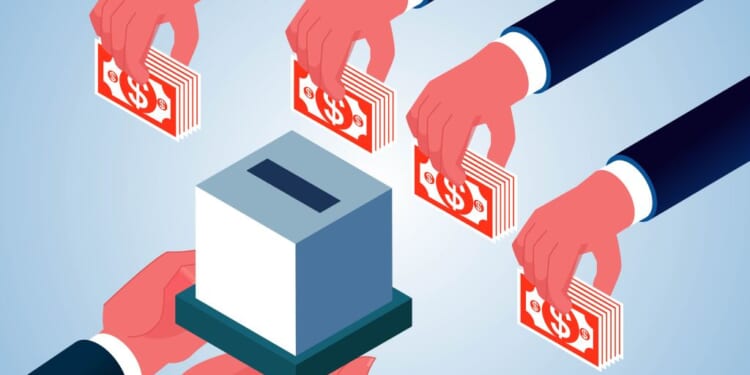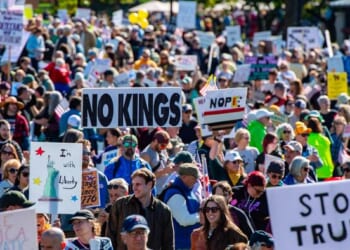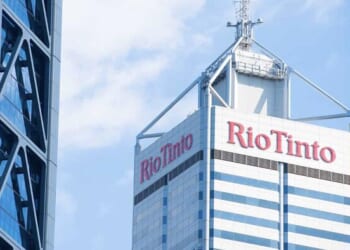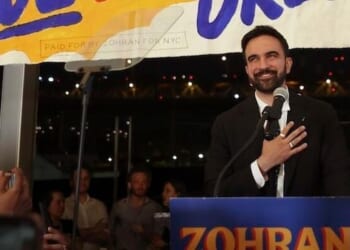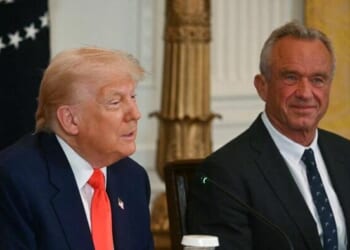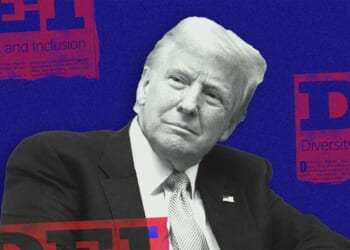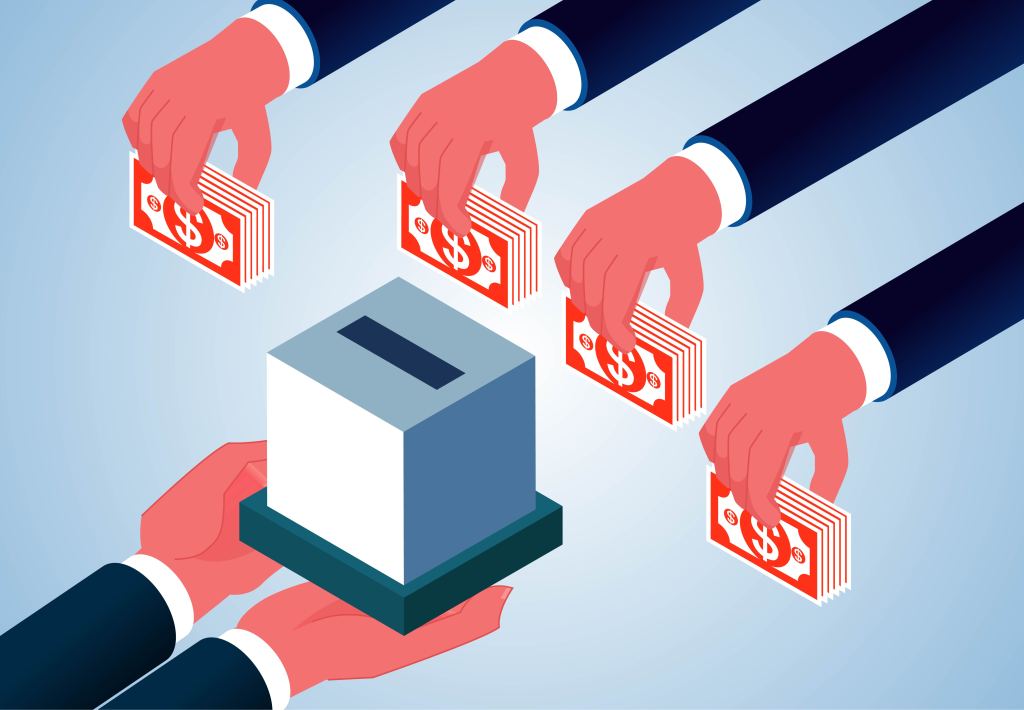
A lawsuit winding its way through federal courts could upend decades of campaign finance law and candidate fundraising strategy. Tax-exempt issue-advocacy organizations, shielded from publicizing their donors, could be empowered to substantially increase participation in traditional electioneering.
The plaintiff in Freedom Path Inc. v. Internal Revenue Service is arguing that federal limitations on political activity placed on 501(c)4 organizations are unconstitutional. Under current law, such groups must devote a healthy majority of their efforts to issue-advocacy but are permitted to engage in some electioneering, such as airing campaign-style advertising and canvassing voters. Like super PACs, these groups can accept unlimited contributions and are typically funded by wealthy donors. Unlike super PACs, their donors can be kept secret from the public.
If Freedom Path’s lawsuit is successful, issue-advocacy groups might be able to significantly expand political engagement as an overall percentage of their activities. That could make 501(c)4 organizations more attractive to megadonors, who might prefer avoiding disclosure in Federal Election Commission (FEC) filings—a legal requirement for super PACs. This outcome would mark a major change in campaign-finance regulations precipitated by the Bipartisan Campaign Reform Act of 2002 and could significantly alter campaign fundraising. And even more money could flood into American politics.
“This case could be as consequential for free speech as Citizens United,” plaintiff’s attorney Chris Gober, a Republican election lawyer, told The Dispatch. Gober, who counts Elon Musk among his notable clients, is seeking the GOP nomination in Texas’ open and newly redrawn 10th Congressional District. (Gober oversaw the Republican Party’s recently completed mid-decade Texas redistricting, an effort undertaken at the behest of President Donald Trump.)
In 2010, the Supreme Court ruled 5-4 in Citizens United v. FEC that laws limiting contributions to political groups by corporations and individuals were unconstitutional. That decision, decried by Democrats and lauded by Republicans, ushered in a new era in American politics defined by big-spending super PACs and fueled by seven- and eight-figure checks written by wealthy party financiers. For years, the FEC prohibited super PACs from coordinating with candidate campaigns but loosened those restrictions in the spring of 2024.
Freedom Path v. IRS is now sitting in the U.S. District Court for the District of Columbia. The timeline and final outcome of the lawsuit are unclear. In 2013, Freedom Path sued the IRS after its application for 501(c)4 status was denied on the grounds that the conservative group was too politically active to qualify as a tax-exempt, issue-advocacy organization.
But last month, Judge Jia M. Cobb, appointed by President Joe Biden, ruled unconstitutional the current regulations—usually referred to as the “facts and circumstances test”—that the IRS uses to determine acceptable political activity for 501(c)4 groups. When Cobb issued her opinion, she asked Gober and the IRS’s lawyers to attempt to negotiate a compromise on a fresh set of rules governing the political activity of 501(c)4s—a new “facts and circumstances test”—that passes constitutional muster.
Gober is confident Cobb’s decision will ultimately lead to new IRS rules that ease the way for issue-advocacy organizations to engage in more overt politicking typically reserved for campaigns, political parties, and super PACs, and without losing their tax exemption or having to disclose donors.
“The unconstitutional ‘facts and circumstances’ test allowed unelected bureaucrats to restrain speech and target conservative nonprofits, so this ruling is bigger than Freedom Path,” said Gober, who is representing Freedom Path on a pro bono basis.
The Brennan Center for Justice, a liberal think tank, calculates that of the roughly $16 billion spent on campaigns in the 2024 election—a total second only 2020—nearly $2 billion of that was “dark money,” the term critics use for contributions to issue-advocacy and similar groups that do not have to publicize donors. Liberals focused on campaign finance worry 501(c)4 organizations will become more powerful in campaigns, and therefore more attractive destinations for campaign cash, if Freedom Path v. IRS is decided for the plaintiff.
Ellen Weintraub, a senior fellow at the advocacy group End Citizens United, told The Dispatch such a result would accelerate the unfair and in some instances corrupting leverage wealthy donors wield over American politics—even when their contributions are given to super PACs and are therefore publicly disclosed. “I see several risks here,” said Weintraub, a former FEC commissioner and four-time panel chair who served from 2002 until she was fired by Trump earlier this year.
“If we’re going to end up in a world where even more money can be funneled through 501(c)4s to avoid disclosure, while still seeking to influence elections, that would be a bad thing,” she added.
A common strategy for campaigns for federal office—the House of Representatives, the Senate, and the White House—is to establish tiered avenues for raising money through which resources are spent to elect the candidate.
Campaigns prioritize raising money directly into their coffers because candidates fully control these political committees. The downside: FEC restrictions limit contributions from individuals to $3,500 and donations from standard political action committees to $5,000 (the joint fundraising committee, a partnership between the campaign and other, similarly regulated political committees, is a legal maneuver that essentially enables skirting these limits).
Enter super PACs, which are allowed to accept money in unlimited amounts, including from donors who have given the maximum allowed under the law to a campaign committee. The downside: Coordination with candidates are limited, tempering their effectiveness, although super PACs are now permitted to coordinate voter canvassing with campaigns.
Issue-advocacy organizations have last call on fundraising. Candidate allies usually form 501(c)4 groups as vehicles to raise unlimited money from wealthy donors who do not want their contributions publicly disclosed in FEC filings. The downside: Limits exist not just on coordination with the candidate’s campaign but on the overall amount of political activity political nonprofits can engage in. Consequently, their ability to impact the outcome of a campaign is often considered questionable—at best.
All of that could change if Freedom Path’s lawsuit is victorious.
A possible, though unlikely, decision, say GOP election lawyers, is that the court rules there should be no limits on the political activity conducted by issue advocacy organizations. Such a decision would render super PACs obsolete because wealthy donors would naturally choose to contribute to entities that do not have to disclose contributions. The more likely outcome if Freedom Path wins: 501(c)4 groups are permitted to engage in more electioneering than allowed currently—and under a rules regime that is more defined and easier to comply with.
Currently, there is a lot of gray area in the IRS’s regulations, keeping Democratic and Republican election lawyers busy advising client groups as to which sort of political activity is, and isn’t, permissible. Accordingly, there is a third scenario for the outcome of Freedom Path v. IRS, and that is that the court comes up with a new “facts and circumstances test” that materially reduces the ability of 501(c)4 organizations to participate in campaign politics. For that reason, some GOP election attorneys prefer to leave well enough alone.
“This does have the potential to be a hugely important case—but it could be hugely important in a bad way,” veteran Republican election lawyer Charlie Spies said in an interview with The Dispatch.

